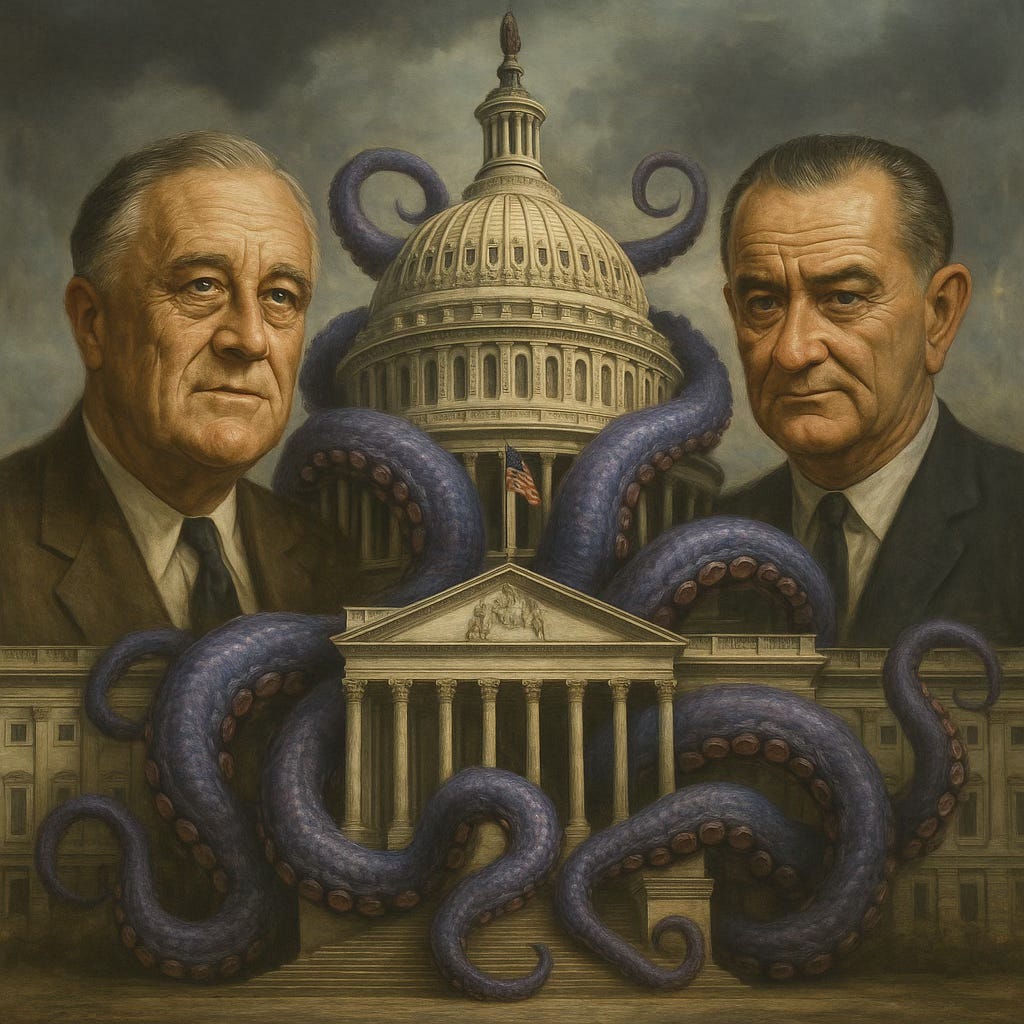The Impact of the New Deal and Great Society: How Two Waves Cemented the Leviathan
Ask most Americans when the federal government became the behemoth it is today, and they’ll probably point to the Biden administration, maybe Obama, or the COVID years. And while they’re not wrong to see tyranny in real time, the truth is the foundations of today’s Leviathan were laid decades ago.
You want to know when the American Republic was truly hollowed out?
Two moments.
Two men.
Two revolutions against the Constitution: Franklin Delano Roosevelt’s New Deal and Lyndon B. Johnson’s Great Society.
These weren’t just policy shifts. They were regime changes, carried out in plain sight, that rewired the relationship between citizen and state—transforming a nation of free people into dependents, and a government of enumerated powers into an unaccountable administrative empire.
The New Deal: When Leviathan Learned to Feed
Let’s set the scene.
In 1932, America was gripped by the Great Depression—economic collapse, unemployment, and widespread panic. Enter FDR, who didn’t let the crisis go to waste. Armed with executive power and an army of intellectuals drunk on European statism, Roosevelt launched a sweeping expansion of government under the banner of the New Deal.
But make no mistake: the New Deal wasn’t just about jobs and recovery. It was about control.
In just a few years, the federal government created dozens of new agencies:
The Social Security Administration—which turned retirement into a government-managed entitlement.
The Securities and Exchange Commission—which gave Washington sweeping authority over financial markets.
The National Recovery Administration—which attempted to centrally plan entire sectors of the economy.
All of this was done in direct contradiction to the Constitution. But Roosevelt didn’t care. When the Supreme Court initially tried to strike down his schemes, he threatened to pack the Court with cronies until he got his way.
The result?
A massive shift in the American system—from individual freedom and private enterprise to central planning and bureaucratic oversight. FDR turned Washington into the center of American life—and the people started looking to D.C. not just for guidance, but for survival.
The Great Society: When Leviathan Learned to Breed
Fast-forward to the 1960s.
The welfare state FDR birthed was now a teenager—and Lyndon B. Johnson was ready to give it a car, a credit card, and an open invitation to move into every aspect of American life.
In his “Great Society” address, LBJ declared war on poverty, injustice, and inequality. Sounds noble, right? Until you look at what he actually built:
Medicare and Medicaid: Massive entitlements that exploded federal healthcare spending and put bureaucrats between patients and doctors.
The Department of Housing and Urban Development: A centralized command center for America’s cities.
The Elementary and Secondary Education Act: The start of federal intrusion into local schools.
And let’s not forget the Office of Economic Opportunity—the nerve center for LBJ’s social engineering agenda, which created layers of dependency and bureaucratic patronage that persist to this day.
The Great Society didn’t lift people out of poverty. It trapped them in it—while inflating a permanent class of bureaucrats, consultants, and politicians who profit from managing decline.
What Did These Eras Really Do?
They normalized the abnormal.
They made it acceptable—expected even—that Washington would:
Tax you at every turn
Redistribute your earnings
Regulate your business
Meddle in your school
Control your doctor
And micromanage every detail of your life
The Founders warned us about this. Jefferson said a government big enough to give you everything you want is strong enough to take everything you have. Madison built a Constitution designed to prevent this outcome. But the New Deal and Great Society shoved all of that aside in the name of progress, equity, and “doing something.”
And now?
You live in a country where unelected agencies issue more law than Congress. Where bureaucrats outlast presidents. Where government dependence is not an exception—it’s a political strategy.
This Is the Legacy of the New Deal and Great Society
Not “helping the poor.”Not “saving democracy.”But building the Leviathan.
An unaccountable, administrative behemoth that was designed not to serve the people—but to rule them.
And unless we’re willing to reject the Progressive premises embedded in both eras—that government can perfect man, that bureaucracy is more trustworthy than elected representatives, and that centralization is the key to justice—then we will remain subjects, not citizens.
Repeal the Revolution
It’s time to defund, dismantle, and decentralize.End the departments that FDR and LBJ created.Restore power to the states, the communities, the people.Rebuild the Republic from the ruins of the regime.
Because if the New Deal and Great Society built the Leviathan…
…it’s time we tear it down.



What about Woodrow Wilson? Was Joe McCarthy ahead of his time?